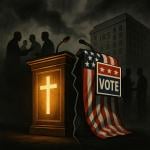
THE RELIGION GUY’S ANSWER:
As it looks toward the annual meeting in June, the Southern Baptist Convention (SBC), by far America’s largest Protestant denomination, faces difficult issues. What tactics might halt its recent membership decline? Should women be forbidden clergy ordination even as assistants, educators, or chaplains? What steps might soothe racial tensions? Are churches too political this election year?
And most important, how can the SBC cleanse itself from sexual abuse scandals?
With all that’s going on, one matter is being ignored. But given the current squabbles and embarrassments, this would seem a good time for the denomination to re-brand itself with a new name.
For starters, the “Southern” monicker is no longer accurate. Yes, some four-fifths of SBC members live in the traditional southeastern turf. But this church body is truly national, active all over the United States, and international, with many overseas staffers and connections.
Unfortunate history
Then there’s unfortunate history to overcome in which the name is enmeshed with slavery. The SBC was formed 179 years ago in a breakaway from U.S. Baptists who insisted slave-owners should no longer be appointed as missionaries. The southern branch was then steadfastly loyal to the Confederacy cause through the Civil War.
Yes, there were secondary factors in this split, including regional solidarity and the southerners’ desire to have a more centralized form of organization. But Baptists’ disagreement over slavery was the key.
This is no new discussion. In the most recent round, last year the SBC’s Executive Committee decided not to proceed on a formal name change as proposed by two attendees at the 2021 annual meeting. They wanted the new designation to be “Great Commission” Baptists, referring to Jesus’ missionary call in biblical Matthew 28:19-20. Though the Executive Committee opposed changing the SBC’s ‘legal name,” it “enthusiastically” affirmed the 2012 meeting’s decision that allows SBC congregations and agencies to use “Great Commission” as an unofficial “descriptor.”
Strengthen and Lengthen
Further back, in 2004 the then SBC President Pastor Jack Graham, proposed that a study committee consider a new name that would “strengthen and lengthen our witness here in America and around the world.” But the subsequent annual meeting backed the traditional name and associated heritage by a 55% majority vote.
The idea had also come up at the 1998 and 1999 annual meetings, but attorneys advised that a name change would be difficult, In that discussion the proposed new names were “Baptist Convention of North America” or “International Baptist Convention.”
One logical new label might be “National Baptist” but that is the longtime name chosen by several historically Black denominations. There’s also “American Baptist,” but that has already been taken by the Pennsylvania-based denomination that descended from the white slavery foes of 1845 (who originally adopted the “Northern Baptist” name).
Powerful Southern Bonds
Showing the power of regional Southern bonds, when moderates broke from the SBC over its increasingly hardline stances they did not unite with the existing American Baptist denomination. Instead, two new bodies with heavy southern membership were created, the Alliance of Baptists (founded 1987) and the Cooperative Baptist Fellowship (1991).
Today’s SBC stands apart from other groups. In 2004 it ended membership among the 240 denominations in the Baptist World Alliance even though the SBC had been instrumental in forming that international body. Domestically, the SBC has never joined the National Association of Evangelicals although its beliefs and mission are without question evangelical.
Many SBC congregations today underplay their affiliation or even drop the “Baptist” label, and for good reason. U.S. Protestants in general have moved away from old denominational identities and loyalties while non-denominational congregations expand and thrive.
Legalities and heritage aside, the SBC is perhaps hesitant because a name change is a marketing tactic that might appear to signify a drift away from the resolute biblical conservatism the old name has always represented, or might indicate that all is not well in the denomination.
Examples of Re-branding
The Conservative Baptist Association of America was founded in 1947 in a walkout from the American Baptist denomination on grounds it wasn’t conservative enough. But that C-word was not considered helpful in 2019 when the group adopted the new name “Venture Church Network.” The official explanation is that “Conservative” is now unfortunately “associated with politics,” while the new “Venture” label announces openness to “bold and courageous steps” in “challenging” times.
Strict conservatives formed the Independent Fundamental Churches of America in 1930 but the group renamed itself in 1997 to be “IFCA International,” presumably because the F-word was something of a slur in the wider society.
The Worldwide Church of God provides a more dramatic case. The group was founded by advertising man turned self-proclaimed prophet Herbert W. Armstrong in 1933, and originally named “Radio Church of God.” After he died in 1986, his successors gradually dropped his eccentric doctrines and embraced Protestant orthodoxy on the Trinity and other matters, causing various schisms. The new theology was recognized when the group was granted membership in the National Association of Evangelicals in 1997. It is now named “Grace Communion International.”
Two denominations stem from the career of Joseph Smith Jr. In 1860, Smith’s son Joseph III and allies established The Reorganized Church of Jesus Christ of Latter Day Saints in opposition to Smith’s polygamy teaching, which the rival, Utah-based Church of Jesus Christ of Latter-day Saints later rejected as well. In 2001, the Reorganized branch renamed itself “Community of Christ” to downplay its historical origins.
Meanwhile, the far larger and better-known Utah branch is seeking to abolish its longstanding and widely-used ‘Mormon” nickname. The church says its full formal name should be used because it was “given by revelation from God” to Smith in 1838. “Restored Church of Jesus Christ” is the group’s preferred alternate. Observers see here an effort to associate the church with conventional Christianity and to distinguish it from the so-called “Mormon Fundamentalists” who perpetuate Smith’s polygamy teaching.













